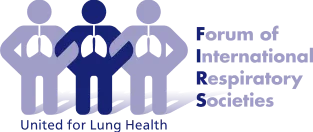
Utrecht, 26 June – In a joint appeal published in The Lancet, 44 leading scientific and social organisations from across the globe including The Forum of International Respiratory Societies (FIRS) and its partner organisations, are calling on Gavi, the Vaccine Alliance, to take urgent action to save millions of young lives by protecting them against respiratory syncytial virus (RSV).
GAVI is a global partnership that works to ensure access to life-saving vaccines for children in the poorest countries. In collaboration with the World Health Organization (WHO), UNICEF and other partners and donors, Gavi has already saved millions of lives by vaccinating children against other major life-threatening diseases.
RSV is a highly contagious virus that causes serious illness in many young children every year. Worldwide, more than 100,000 children under the age of five die from RSV every year, with 97% of these occurring in low- and middle-income countries (LMICs). Infants under six months old are particularly vulnerable, accounting for approximately 45% of RSV-related deaths. These deaths and serious illnesses can be prevented by vaccinating mothers or by giving babies protective treatment after birth.
In 2018, the Gavi Board acknowledged RSV as a priority and signalled support for adding RSV immunisation to its vaccine portfolio, as soon as effective products have been approved by the Strategic Advisory Group of experts (SAGE) of the World Health Organisation (WHO) and sufficient funding is available.
Now, two highly effective products have been approved and introduced in many high- and upper-middle-income countries: the RSVpreF vaccine for pregnant women and RSV monoclonal antibody Nirsevimab for newborn babies. In 2024, the WHO’s SAGE recommended that “All countries introduce products for the prevention of severe RSV disease in infants.”
The availability of sufficient funding is a prerequisite for GAVI to expand its vaccine portfolio with products that protect infants against RSV. However, global funding for vaccination programmes is under growing pressure. This has far-reaching consequences for countries with high child mortality and places additional pressure on Gavi’s budget and its ability to support the introduction of new life-saving interventions.
Heather Zar, paediatric respiratory health specialist at the University of Cape Town and a FIRS and a Pan African Thoracic society Ex-Co member who co-authored the letter, said:
“RSV is a major cause of pneumonia, hospitalisation and deaths in low- and middle-income countries. But this burden is now preventable with one of two new highly effective interventions that are being widely used in high income countries. However, it is urgent that these become available and accessible to all infants especially in areas with the greatest burden globally. On behalf of 44 global leading scientific and social organisations we urge the Gavi board to prioritise RSV prevention and expand access to protect all children against RSV disease, regardless of where they are born.”
Media contact: Fiona.salter@firsnet.org
About the Forum of International Respiratory Societies
The Forum of International Respiratory Societies (FIRS) is an organisation comprised of the world’s leading international respiratory societies working together to improve lung health globally. The goal of FIRS is to unify and enhance efforts to improve lung health through the combined work of its more than 100,000 members globally.
FIRS comprises the American College of Chest Physicians (CHEST), American Thoracic Society (ATS), the Asian Pacific Society of Respirology (APSR), Asociación Latinoamericana de Tórax (ALAT), European Respiratory Society (ERS), International Union Against Tuberculosis and Lung Disease (The Union), Pan African Thoracic Society (PATS), the Global Initiative for Asthma (GINA) and the Global Initiative for Chronic Obstructive Lung Disease (GOLD).
